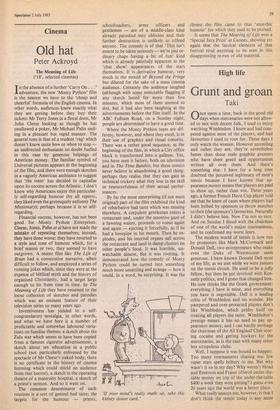Cinema
Old hat
Peter Ackroyd
The Meaning of Life 8', selected cinemas)
In the absence of a further 'Carry On . . adventure, the new 'Monty Python' film is the nearest we have to the 'cheap and
cheerful' formula of the English cinema. In other words, audiences know exactly what they are getting before they buy their tickets: Mr Terry Jones in a floral dress, Mr John Cleese looking as though he has swallowed a poker, Mr Michael Palin smil- ing in a pleasant but vapid manner. The general tone is that of a student 'rag' which doesn't know quite how or when to stop — an undirected enthusiasm no doubt fuelled in this case by generous helpings of American money. The familiar symbol of Universal pictures appears at the beginning of the film, and there were enough sketches in a vaguely American ambiance to suggest that 'the team' has decided to capitalise upon its success across the Atlantic. I don't
know why Americans enjoy this particular- ly self-regarding humour (by all reports, they liked even the grotesquely unfunny The Missionary); perhaps because it is so self- regarding.
Financial success, however, has not been good for Monty Python Enterprises.
Cleese, Jones, PalM et a/ have not made the
mistake of repeating themselves; instead, they have done worse: they have reverted to
a style and tone of humour which, for a brief season or two, they seemed to have outgrown. A recent film like The Life of
Brian had a consecutive narrative, albeit difficult to follow, and employed a series of running jokes which, since they were at the expense of biblical myth and the history of organised Christianity, had a target large
enough to hit from time to time. In The Meaning of Life they have returned to the loose collection of sketches and parodies which was an eminent feature of their television series so many years ago.
Inventiveness has yielded to a self- congratulatory nostalgia, in other words, and what we have here is a number of predictable and somewhat laboured varia- tions on familiar themes: a sketch about the Zulu war which seems to have been copied from a famous cigarette advertisement, a sketch about sex education in a public school (not particularly enlivened by the spectacle of Mr Cleese's naked body; there is no certificate in the history of cinema licensing which could shield an audience from that horror), a sketch in the operating theatre of a maternity hospital, a sketch of a priest's sermon. And so it went on.
The common denominator of such routines is a sort of genteel bad taste; the targets for the humour — priests,
schoolteachers, army officers and gentlemen — are of a middle-class kind already parodied into oblivion and their further destruction is unlikely to offend anyone. The comedy is of that 'This isn't meant to be taken seriously — we're just or- dinary chaps having a bit of fun' kind which is already painfully apparent in the 'chat show' appearances of the stars themselves. It is derivative humour, very much in the mould of Beyond the Fringe but diluted for the sake of a mass cinema audience. Certainly the audience laughed (although with some noticeable flagging if any sketch lasted for more than five minutes, which most of them seemed to do), but it had also been laughing at the advertisements before the film itself. In the ABC Fulham Road, on a Sunday night, people are determined to have a good time.
Where the Monty Python team are dif- ferent, hoWever, and where they excel, is in their use of graphics and visual conceits. There was a rather good sequence, at the beginning of the film, in which a City office block is transformed into a galleon. Yes, you have seen it before, both on television and in The Time Bandits, but these comics never believe in abandoning a good thing: perhaps they realise that they can gain in technical trickery what they lose in the skill or resourcefulness of their actual perfor- mances.
By far the most enterprising (if not most original) part of the film exhibited the kind of rebarbative bad taste which was missing elsewhere. A corpulent gentleman enters a restaurant and, under the attentive gaze of a fawning waiter, proceeds to vomit again and again — ejecting it forcefully, as if he had a hosepipe in his mouth. Then he ex- plodes, and his internal organs sail across the restaurant and land in damp clusters on other people's food. It was horrible, un- watchable almost, but it was riveting. It demonstrated how the comedy of Monty Python could be turned into something much more unsettling and strange — how it could, in a word, be surprising. It was the
'If your mind's really made up, take this kidney donor card.'
closest the film came to that 'anarchic humour' for which they used to be praised.
It seems that The Meaning of Life won a 'Special Jury Prize' at Cannes, showing yet again that the farcical elements of that festival rival anything to be seen in this disappointing re-run of old material.






































 Previous page
Previous page